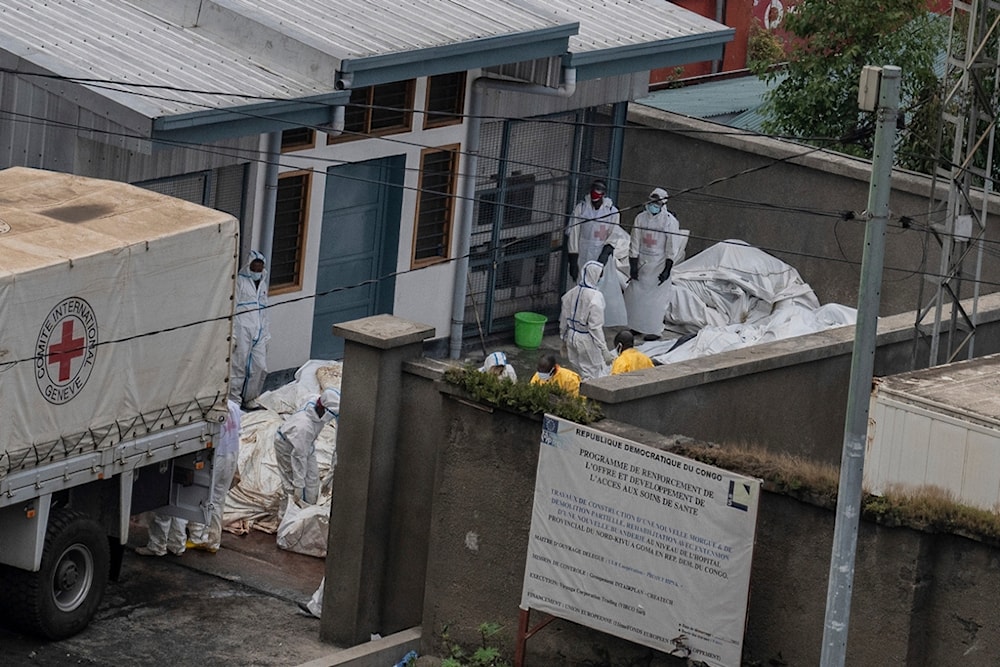Hundreds of women raped, burned alive in Goma prison fire
Atrocity unfolds as thousands of male inmates escape amid chaos, following the takeover of eastern DRC by Rwandan-backed M23 militants.
-

Red Cross personnel load bodies of victims of the fighting between Congolese government forces and M23 rebels in a truck in Goma, on Monday, February 3, 2025. (AP)
Hundreds of women were raped and burned alive amid the chaos that followed the entry of Rwandan-backed militants into the Congolese city of Goma last week.
According to a senior UN official, the female inmates were assaulted inside the women’s wing of Goma’s Munzenze prison during a mass jailbreak.
Vivian van de Perre, deputy head of the UN peacekeeping force based in Goma, reported that while several thousand male prisoners managed to escape, the section housing women was deliberately set on fire.
Images captured shortly after the arrival of M23 militants in central Goma on 27 January show thick black smoke billowing from the prison. Although details remain scarce, the incident appears to be one of the worst atrocities linked to the ongoing M23-led conflict in the eastern Democratic Republic of the Congo. However, with UN peacekeepers unable to access the site due to restrictions imposed by the rebels, the identity of those responsible remains uncertain.
By Tuesday, reports emerged that approximately 2,000 bodies were still awaiting burial in Goma following the rebel takeover of North Kivu’s provincial capital on January 27.
Van de Perre, stationed in Goma alongside thousands of UN peacekeeping troops deployed to protect civilians, stated, "There was a major prison breakout of 4,000 escaped prisoners. A few hundred women were also in that prison.
"They were all raped and then they set fire to the women’s wing. They all died afterwards."
Driving the news
This week, the UN Office of the High Commissioner for Human Rights (OHCHR) warned that rival armed groups in Goma were using sexual violence as a weapon of war.
The city, home to more than a million people, remains under the full control of M23 militants. However, in an unexpected development late on Monday, the militia declared a unilateral "ceasefire".
Until then, concerns had been rising over Rwanda’s potential plans to seize further territory from its vast neighbor, with M23 forces steadily advancing south toward Bukavu, the capital of South Kivu province, located 190km (120 miles) from Goma.
A political-military coalition that includes M23, the Alliance Fleuve Congo (Congo River Alliance), issued a statement asserting that it had "no intention of taking control of Bukavu or other localities."
Commenting on the ceasefire, Van de Perre remarked, "I hope it stays that way because they [M23] were already moving in the direction of Bukavu with reinforcements and heavy weaponry, which can be seen passing [along] the streets in Goma."
"If they retreat, that’s good news. Otherwise, we’ll have a new clash with potentially thousands of additional deaths."
She suggested that M23’s decision may have been influenced by the recent deployment of Burundian reinforcements in Bukavu and the use of a nearby airport by the Congolese Air Force.
"The Burundians have sent 2,000 extra troops to Bukavu, and they are very good fighters. I think M23 is currently rethinking their next steps," she said.
The big picture
Despite mounting evidence, Rwanda continues to deny any involvement with M23 or any incursion into eastern Congo.
However, Van de Perre, who is part of the UN peacekeeping force Monusco, stated that her team had observed Rwandan soldiers during patrols, describing their presence as so overt that it suggests a lack of concern over international consequences.
She called on the UN Security Council to apply greater diplomatic pressure on Rwanda. "We really need to get back to the negotiating table. And that is only possible if the members of the security council and other important countries exert enough pressure on Rwanda and Congo," she said.
Another senior UN official previously speculated that Rwanda had long-term ambitions to absorb a portion of DRC larger than Rwanda itself. "This is a long-term policy to get the broader Kivu area into the sphere of Rwandan influence and, later, under complete administrative control," they said.
Before the ceasefire announcement, Van de Perre expressed concern over reports of groups preparing a counteroffensive. "We already have reports that in certain places people are gathering and organizing," she warned.
She also noted the dire humanitarian conditions in Goma, where movement remains severely restricted. "They [the M23] allow us to bring food and water to our bases, but apart from that we can barely move around," she said.

 4 Min Read
4 Min Read








